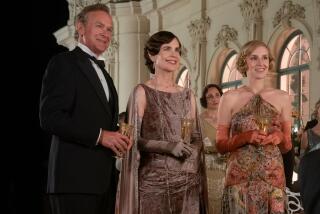More real-life ‘Downton Abbey’: Notes from a life ‘in service’
- Share via
In a blog post last week, I linked to an obit for Florence Wadlow, a real-life Mrs. Patmore. Afterward, I received a fascinating email from a reader named Trevor Middleton. Because “Downton Abbey” seems to be all anyone can talk about today (Did something happen last night? I’ve got it on DVR), I thought I’d pass it along.
“In 1977, when my grandmother died, her legacy to us was a cardboard box -- a small cube of corrugated card, each side measuring about about 12 inches. In it were her school reports and a huge cache of letters she’d written to my future grandfather, when she was in service in the early years of the twentieth century. My grandmother had been 12 when her mother died in childbirth (the baby -- Kezia -- died not long afterwards) and, as the youngest of four children, she found she was now expected to earn her keep, like her siblings. In those days children left school at 13, so she was given special dispensation to leave early and start work in service, as a maid.
“Her life as she described it to me was very like Mrs. Wadlow’s: she had to rise early to make the fires and prepare the hot water for the master’s morning ablutions, so she would lay out her uniform carefully under her mattress and sleep on it, in order to press it flat and keep it warm. On one occasion early on in her career, she was scrubbing a floor, and had placed the hand that wasn’t holding the scrubbing brush flat on the floor, palm downwards and fingers outwards. The housekeeper saw this, calmly walked over and deliberately trod on my grandmother’s fingers, to ‘teach her’ not to make the same faux pas next time. There was no particular reason: the housekeeper disapproved, and that was all there was to it.
“The one bright spot in my grandmother’s week seems to have been her half day off, when the master and mistress allowed her occasionally to take the children of the house to see my future grandfather and the small menagerie he kept at his mother’s house -- all, however, for sound practical reasons: goats for their milk, chickens, ducks and geese for their eggs. I only found this out when I read through those letters after her death, and long after my grandfather’s.
“So yes, it probably is about time the reality behind ‘Downton Abbey’ was set before the public. It’s always surprised me that a country founded during the Enlightenment, along rationalist lines, should fall so hard for a TV series predicated on good old English feudalism and class divisions -- then I take a look at some of the headlines on CNN’s website and think to myself well, maybe you need a bit of escapism.”
Middleton also writes: “You might find it of interest to know that the town where my grandmother was in service was Eastwood, Nottinghamshire -- D.H. Lawrence’s home town. In fact, they knew many of the same people. My grandfather, by the way, was spared the trenches of the First World War because, as coal miners, he and his workmates were in a so-called ‘reserved occupation.’
“Incidentally, in the late 1980s I met Lawrence’s niece, Peggy, who was by then well into her 80s: When she found out I was interested in her uncle’s work she invited me round for tea. At one point during my visit, she disappeared into another room, returning with a photo album full of postcards -- all from her ‘Uncle Bert’, who was, by the time he wrote them, on his travels round the world with his scandalously acquired wife, Frieda.”
ALSO:
Pasta fagioli and Barbera
Yotam Ottolenghi on discipline
More to Read
Eat your way across L.A.
Get our weekly Tasting Notes newsletter for reviews, news and more.
You may occasionally receive promotional content from the Los Angeles Times.











